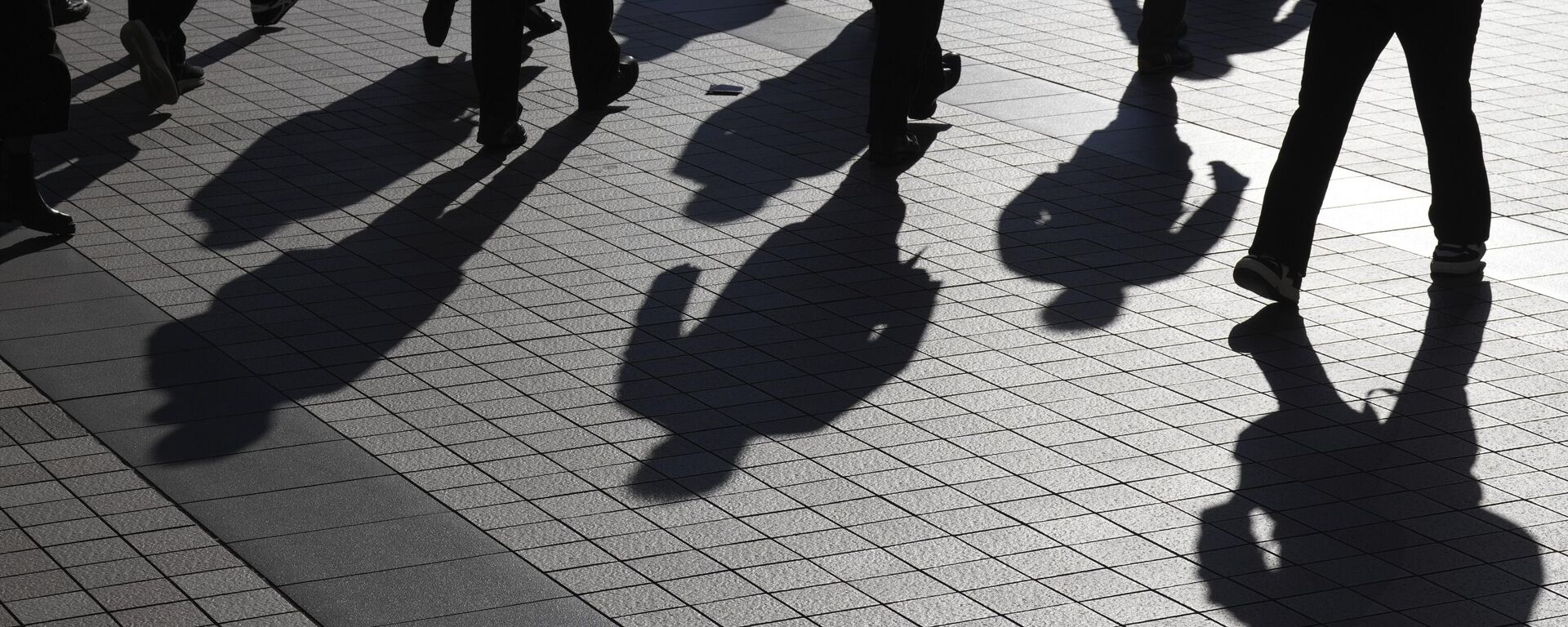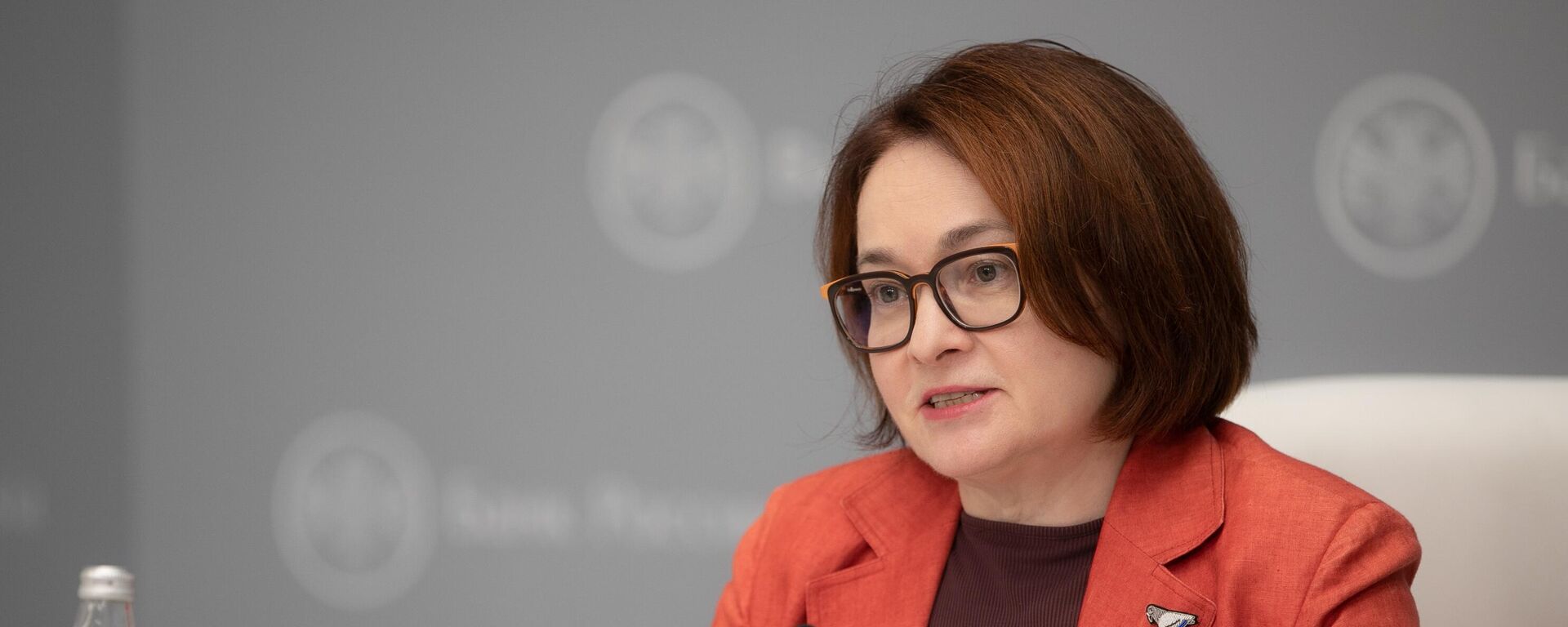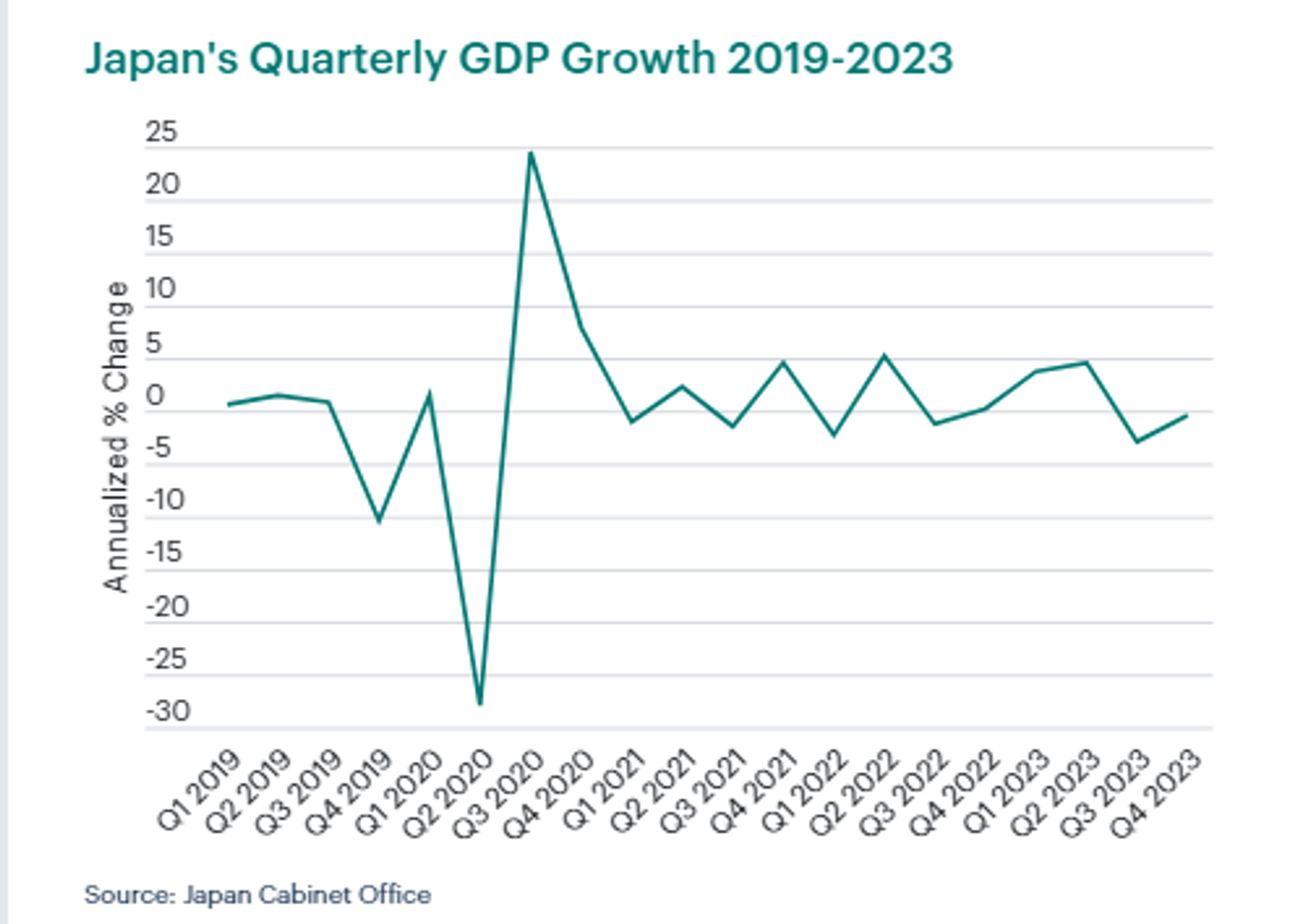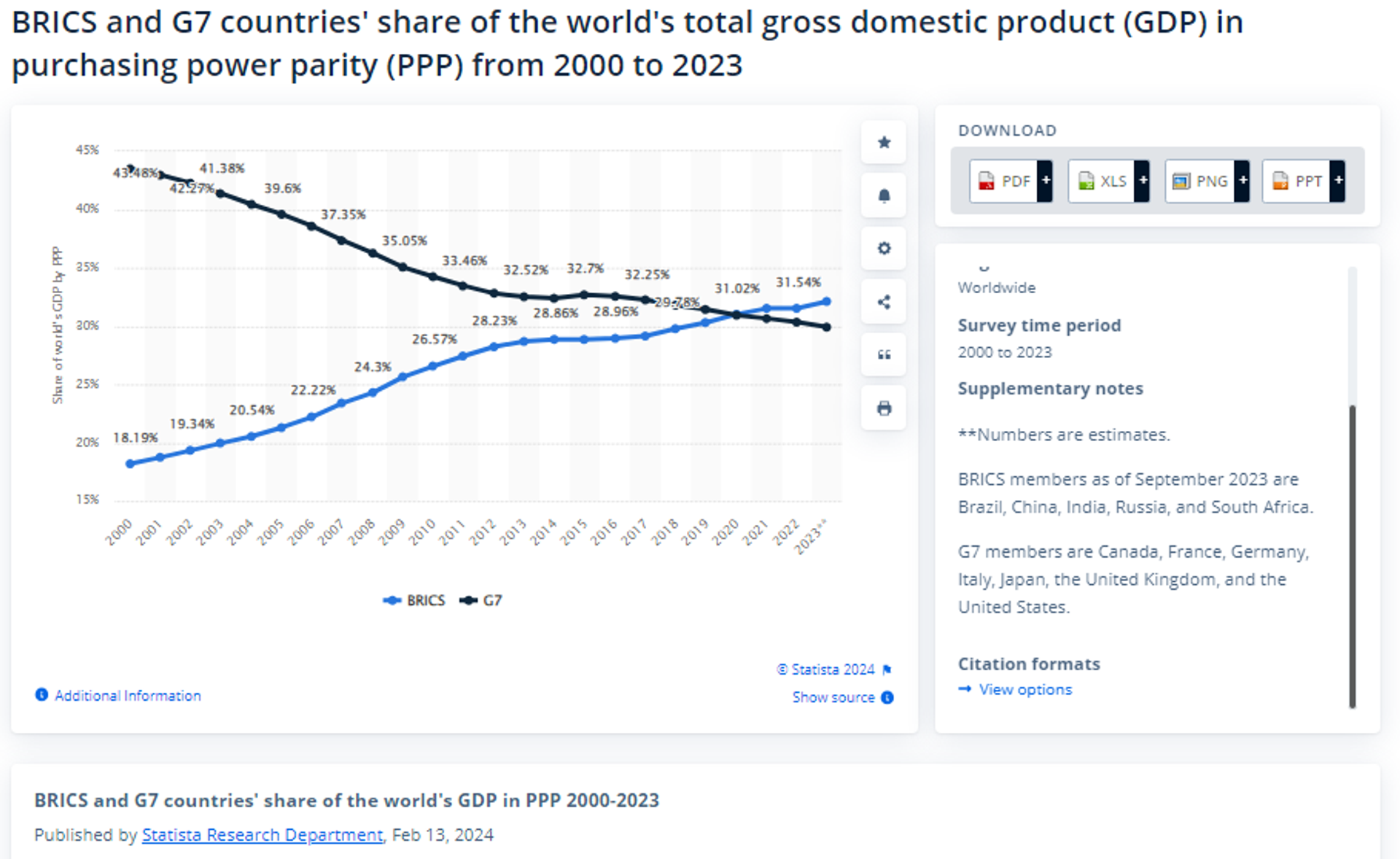https://sputnikglobe.com/20240218/gdp-sanctions-two-economic-blocs-brics-versus-g7-performance-in-2023-1116860247.html
GDP, Sanctions, Two Economic Blocs: BRICS Versus G7 Performance in 2023
GDP, Sanctions, Two Economic Blocs: BRICS Versus G7 Performance in 2023
Sputnik International
Last December, Russian Foreign Minister Sergey Lavrov predicted that the combined GDP of the BRICS countries together with its new members — Egypt, Iran, the... 18.02.2024, Sputnik International
2024-02-18T16:59+0000
2024-02-18T16:59+0000
2024-02-18T16:59+0000
economy
g7
brics
economic recession
recession
japan
britain
russia
https://cdn1.img.sputnikglobe.com/images/sharing/article/eng/1116860247.jpg?1708275541
As the newly-expanded BRICS bloc of nations is set to outpace the Group of Seven in share of global GDP by 2028.Three of G7 countries are already facing serious economic problems.Germany’s economic crisis plunged Europe's once-leading economy into a technical recession last year, complete with deindustrialization and soaring inflation. Heavily-industrialized Germany has been hit harder than other EU members by sanctions on Russian gas, oil and coal imports.Source: International Monetary Fund Real GDP growth statistics.Fellow G7 member Japan followed suit, faced with its first recession in five years in the last quarter of 2023. The Asian giant lost the title of the world's third-largest economy to Germany by the end of 2023, according to Japanese government data. Its economy shrank by an annualized rate of 0.4 percent in the fourth quarter of 2023, official data released on February 15 showed.Japan’s economy had already suffered a 2.9 percent contraction between July and September last year — a technical recession — as anti-Russian sanctions over the Ukraine conflict had a “boomerang effect” rather than doing damage to Moscow.Not to be outdone, Britain joined Japan among the G7 members mired in a recession. UK GDP fell by 0.2 percent year-on-year in the fourth quarter of 2023 – its second consecutive quarterly decline, according to the country's Office for National Statistics (ONS). Overall British GDP is believed to have increased by a mere 0.1 percent in 2023, with output shrinking in December by 0.1 percent. GDP per capita contracted by 0.6 percent in the fourth quarter.All three of the above-mentioned G7 countries are grappling with grim economic forecasts for the future.As for the BRICS countries, they first overtook the G7 member-states' share of the world's total gross domestic product (GDP) in terms of purchasing power parity (PPP) in 2020. By 2023 they outpaced the G7 — which includes Canada, France, Germany, Italy, Japan, the United Kingdom, and the US as well as the European Union even further. The BRICS group now boasts 32 percent of the world's GDP, compared to 30 percent generated by the G7 countries, according to data released by Statista Research Department this week.At the time of the BRICS summit last year, Russia’s President Vladimir Putin noted that the ratio of wealth of the G7 to BRICS favoured the expanded bloc's goal of building a multilateral and multipolar international economic infrastructure.Russian Foreign Minister Sergey Lavrov noted last December that the share of Global South and Global East countries in the overall world economy was growing, partly thanks to the many errors and unacceptable actions by the United States and its allies."The total GDP of the BRICS in the new line-up will already significantly exceed that of the G7" in 2024, Lavrov said.Echoing this forecast, President of BRICS New Development Bank, former Brazilian President Dilma Rousseff said at the World Governments Summit in Dubai on February 13 that the share of BRICS members (Brazil, Russia, India, China, South Africa) in global GDP will increase from 35 percent to 40 percent by 2028, while the share of G7 countries will drop to 27.8 percent.
https://sputnikglobe.com/20240215/japans-economy-in-vicious-circle-due-to-anti-russian-sanctions-1116804552.html
https://sputnikglobe.com/20240129/share-of-brics-exceeds-g7-in-global-economy-by-end-of-2023--russian-central-bank-head-1116474426.html
https://sputnikglobe.com/20240105/five-new-countries-join-brics-including-iran-and-saudi-arabia-1115980147.html
japan
britain
russia
Sputnik International
feedback@sputniknews.com
+74956456601
MIA „Rossiya Segodnya“
2024
News
en_EN
Sputnik International
feedback@sputniknews.com
+74956456601
MIA „Rossiya Segodnya“
Sputnik International
feedback@sputniknews.com
+74956456601
MIA „Rossiya Segodnya“
g7, g7 economic problems, g7 countries in recession, japanese economy, recession in japan, britain in recession, german economy in recession, brics countries, gdp of brics countries,
g7, g7 economic problems, g7 countries in recession, japanese economy, recession in japan, britain in recession, german economy in recession, brics countries, gdp of brics countries,
GDP, Sanctions, Two Economic Blocs: BRICS Versus G7 Performance in 2023
Last December, Russian Foreign Minister Sergey Lavrov predicted that the combined GDP of the BRICS countries together with its new members — Egypt, Iran, the United Arab Emirates, Saudi Arabia and Ethiopia — would far exceed that of the Group of Seven (G7) countries, with the trend set to further strengthen.
As the
newly-expanded BRICS bloc of nations is set to outpace the Group of Seven in share of global GDP by 2028.
Three of G7 countries are already facing serious economic problems.
Germany’s economic crisis plunged Europe's once-leading economy into a technical recession last year, complete with deindustrialization and soaring inflation. Heavily-industrialized Germany has been hit harder than other EU members by sanctions on Russian gas, oil and coal imports.
G7 and BRICS Nations: IMF data on annual percent change of real GDP growth for 2023
G7 Country | GDP growth | BRICS Country | GDP growth |
Canada | 1.3% | Brazil | 3.1% |
France | 1.0% | Russia | 2.2% |
Germany | 0.5% | India | 6.3% |
Italy | 0.7% | China | 5.0% |
Japan | 2.0% | South Africa | 0.9% |
Britain | 0.5% | | |
European Union | 0.1% | | |
Source: International Monetary Fund Real GDP growth statistics. Fellow G7 member
Japan followed suit, faced with its first recession in five years in the last quarter of 2023. The Asian giant
lost the title of the world's third-largest economy to Germany by the end of 2023, according to Japanese government data. Its economy shrank by an annualized rate of 0.4 percent in the fourth quarter of 2023, official data released on February 15 showed.
Japan’s economy had already suffered a 2.9 percent contraction between July and September last year — a technical recession — as
anti-Russian sanctions over the Ukraine conflict had a “boomerang effect” rather than doing damage to Moscow.
A recession is typically defined as two consecutive quarters of economic contraction.

15 February 2024, 18:58 GMT
Not to be outdone,
Britain joined Japan among the G7 members mired in a recession. UK GDP fell by 0.2 percent year-on-year in the fourth quarter of 2023 – its second consecutive quarterly decline, according to the country's Office for National Statistics (ONS).
Overall British GDP is believed to have increased by a mere 0.1 percent in 2023, with output shrinking in December by 0.1 percent. GDP per capita contracted by 0.6 percent in the fourth quarter.
All three of the above-mentioned G7 countries are grappling with grim economic forecasts for the future.
As for the BRICS countries, they first overtook the G7 member-states' share of the world's total gross domestic product (GDP) in terms of purchasing power parity (PPP) in 2020. By 2023 they outpaced the G7 — which includes Canada, France, Germany, Italy, Japan, the United Kingdom, and the US as well as the European Union even further. The BRICS group now boasts 32 percent of the world's GDP, compared to 30 percent generated by the G7 countries, according to data released by
Statista Research Department this week.
The BRICS group currently includes Brazil, Russia, India, China and South Africa. Following the BRICS summit on August 22-24 in Johannesburg, South African President Cyril Ramaphosa announced the expansion of the group. On January 1, 2024, new members Egypt, Iran, the United Arab Emirates, Saudi Arabia and Ethiopia formally joined BRICS.
At the time of the
BRICS summit last year, Russia’s President Vladimir Putin noted that the ratio of wealth of the G7 to BRICS favoured the expanded bloc's goal of building a multilateral and multipolar international economic infrastructure.
Russian Foreign Minister Sergey Lavrov noted last December that the share of Global South and Global East countries in the overall world economy was growing, partly thanks to the many errors and unacceptable actions by the United States and its allies.
"The total GDP of the BRICS in the new line-up will already significantly exceed that of the G7" in 2024, Lavrov said.
Echoing this forecast, President of
BRICS New Development Bank, former Brazilian President Dilma Rousseff said at the World Governments Summit in Dubai on February 13 that the share of BRICS members (Brazil, Russia, India, China, South Africa) in global GDP will increase from 35 percent to 40 percent by 2028, while the share of G7 countries will drop to 27.8 percent.

29 January 2024, 17:42 GMT
5 January 2024, 04:04 GMT





